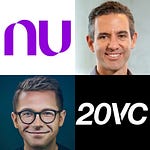Nico Wittenborn is the Founder of Adjacent, one of the best early-stage firms created over the last 5 years. Before starting Adjacent, Nico spent over 3 years at Insight Partners in New York and before that learned the craft of venture from some of the best in early-stage, Point Nine, where he spent over 4 years. Nico's portfolio across funds includes the likes of Revolut, Chainalysis, Oura, RevenueCat and PhotoRoom to name a few.
In Today's Show with Nico Wittenborn We Discuss:
1.) From Selling Mobile Phones to Leading Early-Stage Investor:
How did Nico first make his way into the world of venture with Point Nine?
What did Nico learn from his time with Point Nine and Insight? How did his time at each impact how he invests and runs Adjacent today?
What does Nico know now that he wishes he had known when he started investing?
2.) Is Consumer Subscription Even a Good Place to Invest?
With Calm ($2BN) and Duolingo ($6BN) as the market leaders and there only being two of them, is consumer subscription even a good place to invest?
How does Nico pushback that retention for consumer subscription apps is so bad? What do many not see about consumer subscription retention numbers?
How does Nico respond to the challenge of high customer acquisition cost and navigating challenging platform shifts in advertising, when investing in consumer subscription?
What will the consumer subscription landscape look like in 5 years time?
3.) Adjacent: The Fund, The Strategy:
Why does Nico believe if your fund model relies on $10BN outcomes, you are in trouble?
How large is the latest Adjacent fund? What does the portfolio construction look like for the fund?
How much diversification is the right level of diversification? How many companies per fund?
How does Nico think about capital concentration on a per company basis?
What are Nico's ownership requirements? How have they changed with funds?
What is it about Nico's structure which enables him to be more collaborative than others?
4.) Nico: The Investor: Lessons:
How does Nico reflect on his own relationship to price? When does he pay up? When does he not?
What has been one of Nico's biggest misses? How has that changed his approach?
Why does Nico not really compete with the large multi-stage funds?
Why is Nico deliberately trying to reduce the amount of companies that he sees?
5.) The Future of Venture:
How does Nico analyze the rise of solo GPs? What are the biggest pros and cons of the model?
Why does Nico believe the large generalist funds are in trouble?
Who is set to win and who is set to lose in the next 10 years of venture?
Which seed firm would Nico invest in? Which Series A firm? Which growth firm?













Share this post